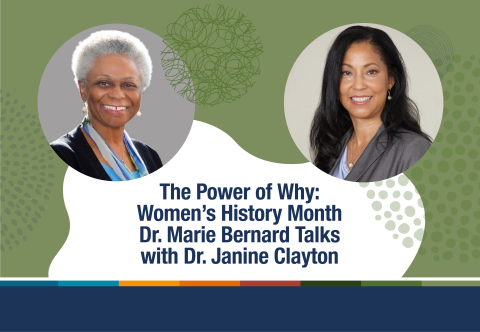
Photo of Marie A. Bernard, M.D. and Janine Clayton, M.D. Credit: NIH
As we celebrate Women’s History Month and look back at pioneers, I reached out to a current pioneer in women’s health: my colleague Janine Clayton, M.D., Director of the NIH Office of Research on Women’s Health (ORWH).
She shared why it is crucial for women to be leaders in science, creative ways ORWH helps scientists succeed, a bit about her journey, news on a White House initiative, and one thing everyone can do.
If You Can See It
“Women in scientific and medical leadership help women and girls aspiring to careers in science to see pathways, said Dr. Clayton. “There is a saying, ‘If you can see it, you can be it.’ It sounds simplistic, but the truth is that regularly seeing women in all the roles in science at every level sets expectations for everyone.”
Thankfully, NIH has an increasing number of women in leadership roles who set expectations—and standards of excellence—including Dr. Clayton and the Director of NIH Monica Bertagnolli, M.D. In addition, 41% of institute and center directors at NIH are women.
ORWH Helping Women Scientists
Yet, women in science still face obstacles. “Science can be a demanding and unforgiving career path. It can be even more challenging for women,” she said. “The COVID-19 pandemic highlighted that it was women who bore the brunt of caregiving. I was particularly concerned about the potential impact on women scientists.”
ORWH developed administrative supplements to help. “These supplements allow people to get support to continue research if they experience a qualifying life event, such as primary caregiving for an ill family member or the birth or adoption of a child,” she said. “We also have reentry, and reintegration, supplements across NIH. If you're in an unsafe research environment, like experiencing sexual harassment, a supplement can allow you to move to another environment.”
In addition, ORWH was involved in creating retraining supplements that allow scientists to gain new skills. “We need a diverse and inclusive scientific workforce,” she said. “These supplements can support people stay in science by providing multiple paths and options to navigate obstacles.”
From NEI to ORWH
Dr. Clayton’s career proves there's no one way to pursue a particular passion. Before becoming the Director of ORWH, Dr. Clayton served as Deputy Clinical Director at NIH’s National Eye Institute (NEI). “I don't know anybody else who did ophthalmology and then women's health,” she said.
While Dr. Clayton was at NEI, a paper came out with findings that she had never been taught in medical school or learned during her residency. The paper revealed that two-thirds of people who are blind are women. The disparity was notable despite women living longer than men and extended globally.
She was incredulous.
“I wanted to find a way to explain these findings by sex and gender factors, and just as importantly, I couldn't find evidence of people asking why?” she said. “It got me more interested in trying to have a larger impact in women's health.”
This keen interest in women’s health and a detail as a special assistant working for Vivian Pinn, M.D., the first full-time director of ORWH, opened the door for Dr. Clayton to become director of ORWH in 2012.
“As a questioning person, my position is incredibly stimulating intellectually,” she explained. “At ORWH, we have an impact across multiple disciplines, multiple fields, and multiple diseases and conditions.”
A First for Women’s Health
Prioritizing women’s health is now a national initiative. In November 2023, President Biden announced the White House Initiative on Women’s Health Research, an effort led by First Lady Jill Biden and the White House Gender Policy Council. On February 21, Dr. Biden shared the initiative’s audacious goal: “to fundamentally change how our nation approaches and funds women’s health research.”
Dr. Clayton, along with Dr. Bertagnolli and other federal leaders in health care serve on the initiative. “It is heartening to see the White House express an interest in understanding the gaps in knowledge about women's health and the need to accelerate progress in addressing the unique health needs of women across their lifespan,” said Dr. Clayton. “This initiative prioritizes women's health research.”
Keep Learning and Questioning
To learn more about women’s health research, I urge you to check out resources available through ORWH and get involved in advancing women’s health. As Dr. Clayton says, there's one thing that everyone can do. “If you're touching the health enterprise, you have an opportunity to ask questions,” she said. “Asking why can encourage people to think about an issue differently.”
In the COSWD office, we like to say, “Great minds think differently.”

